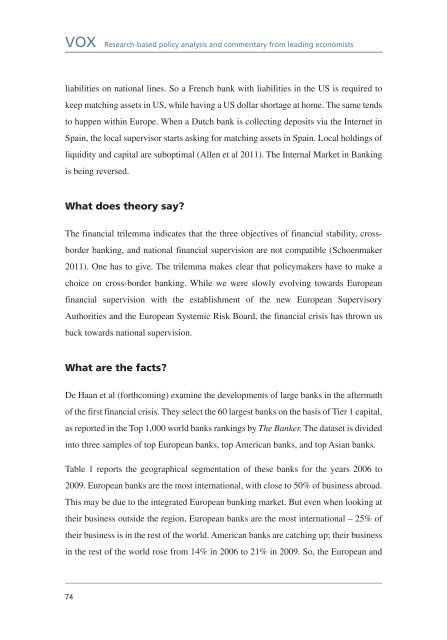You also want an ePaper? Increase the reach of your titles
YUMPU automatically turns print PDFs into web optimized ePapers that Google loves.
VOX Research-based policy analysis and commentary from leading economists<br />
liabilities on national lines. So a French bank with liabilities in the US is required to<br />
keep matching assets in US, while having a US dollar shortage at home. The same tends<br />
to happen within Europe. When a Dutch bank is collecting deposits via the Internet in<br />
Spain, the local supervisor starts asking for matching assets in Spain. Local holdings of<br />
liquidity and capital are suboptimal (Allen et al 2011). The Internal Market in Banking<br />
is being reversed.<br />
What does theory say?<br />
The financial trilemma indicates that the three objectives of financial stability, crossborder<br />
banking, and national financial supervision are not compatible (Schoenmaker<br />
2011). One has to give. The trilemma makes clear that policymakers have to make a<br />
choice on cross-border banking. While we were slowly evolving towards European<br />
financial supervision with the establishment of the new European Supervisory<br />
Authorities and the European Systemic Risk Board, the financial crisis has thrown us<br />
back towards national supervision.<br />
What are the facts?<br />
De Haan et al (forthcoming) examine the developments of large banks in the aftermath<br />
of the first financial crisis. They select the 60 largest banks on the basis of Tier 1 capital,<br />
as reported in the Top 1,000 world banks rankings <strong>by</strong> The Banker. The dataset is divided<br />
into three samples of top European banks, top American banks, and top Asian banks.<br />
Table 1 reports the geographical segmentation of these banks for the years 2006 to<br />
2009. European banks are the most international, with close to 50% of business abroad.<br />
This may be due to the integrated European banking market. But even when looking at<br />
their business outside the region, European banks are the most international – 25% of<br />
their business is in the rest of the world. American banks are catching up; their business<br />
in the rest of the world rose from 14% in 2006 to 21% in 2009. So, the European and<br />
74














